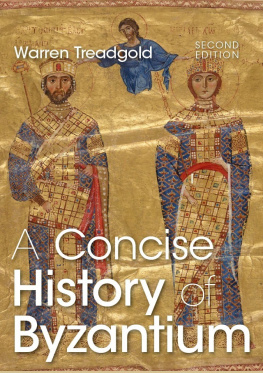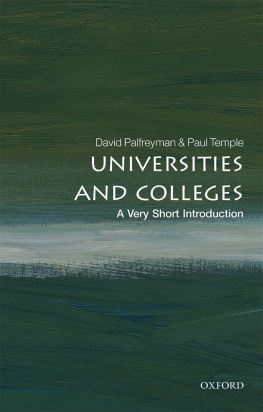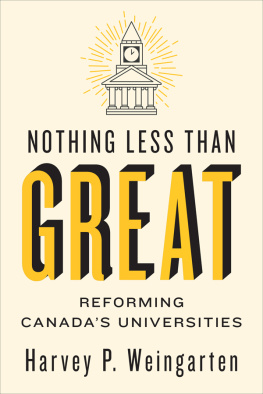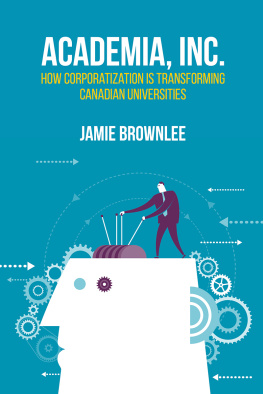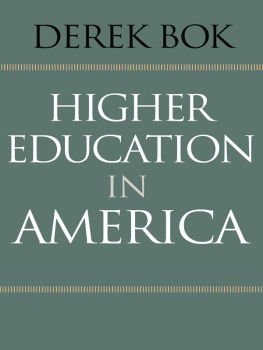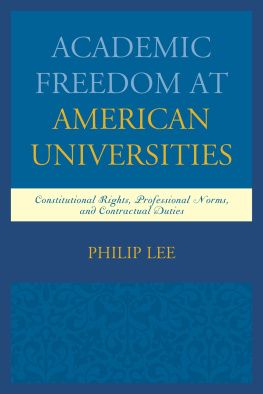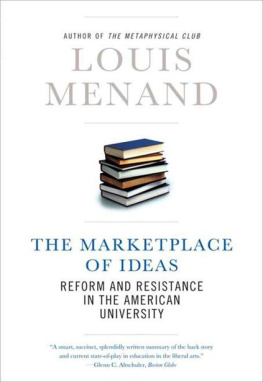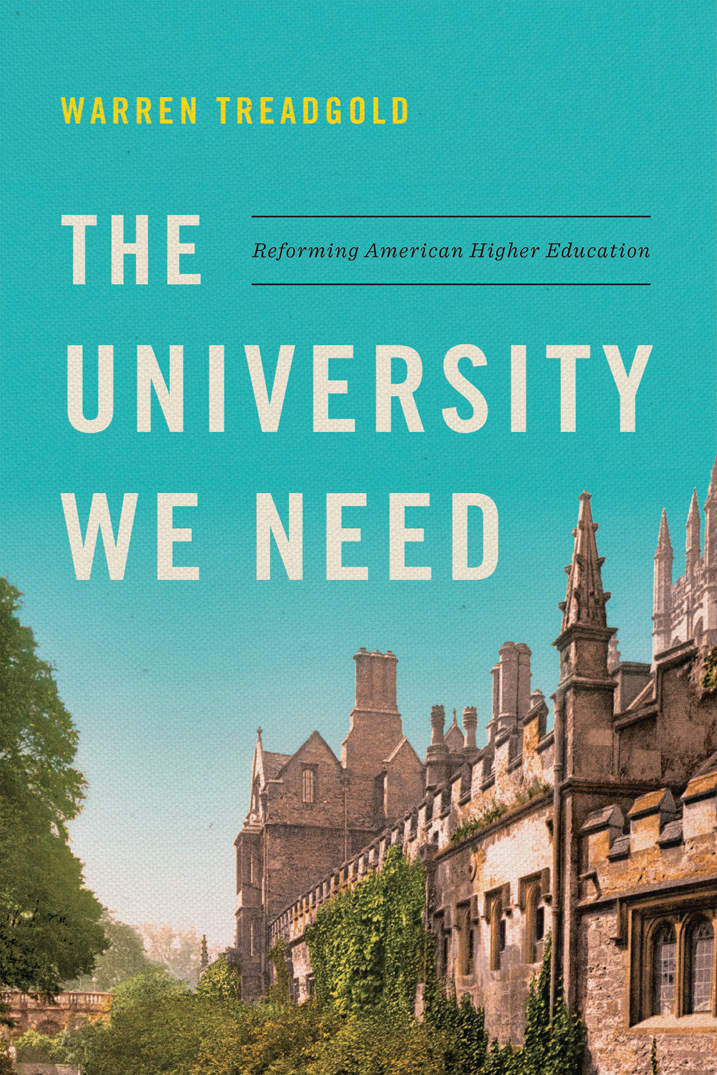


2018 by Warren Treadgold
All rights reserved. No part of this publication may be reproduced, stored in a retrieval system, or transmitted, in any form or by any means, electronic, mechanical, photocopying, recording, or otherwise, without the prior written permission of Encounter Books, 900 Broadway, Suite 601, New York, New York, 10003.
First American edition published in 2018 by Encounter Books, an activity of Encounter for Culture and Education, Inc., a nonprofit, tax exempt corporation.
Encounter Books website address: www.encounterbooks.com
The paper used in this publication meets the minimum requirements of ANSI/NISO Z39.481992 (R 1997) (Permanence of Paper).
FIRST AMERICAN EDITION
LIBRARY OF CONGRESS CATALOGING-IN-PUBLICATION DATA
Library of Congress Cataloging-in-Publication Data
Names: Treadgold, Warren, 1949 author.
Title: The university we need: reforming American higher education / Warren Treadgold.
Description: New York: Encounter Books, [2018] | Includes bibliographical references and index.
Identifiers: LCCN 2017039031 (print) | LCCN 2017059578 (ebook) | ISBN 9781594039904 (Ebook)
Subjects: LCSH: Education, HigherAims and objectivesUnited States. | Educational changeUnited States.
Classification: LCC LA227.4 (ebook) | LCC LA227.4 .T375 2018 (print) | DDC 378.73dc23
LC record available at https://lccn.loc.gov/2017039031
Interior page design and composition: BooksByBruce.com
To the many fine scholars
who have left the academic profession
over the past fifty years in disgust or despair
Table of Contents
Guide
CONTENTS
This book is more candid than most books written about higher education by professors. Even professors who know that something is seriously wrong are usually reluctant to criticize the college or university where they work, at least until they have a chance to leave, or to make negative statements that apply to most or all colleges or universities. Criticizing your own institution not only can offend your colleagues and embarrass your students but also can hurt the reputation of the whole community in which you live. Being an outspoken critic of most or all universities can also hurt your chances of finding another job. On the other hand, if no one speaks out, the resulting silence can become a sort of academic omert, giving outsiders the false impression that all is well, or at least not so terribly bad, and leaving the task of criticizing higher education to commentators who have little understanding of it. This is one reason that almost all of the many recent books about the problems of higher education fail to make specific or practical proposals for improving it: the insiders are unwilling to propose shaking things up very much, and the outsiders have no clear idea of what needs to be done. In reading many of those books, most of which are longer than this one, I have found few if any proposals as specific and feasible as those suggested here.
Some readers will probably think these proposals are too big and ambitious to be feasible. Many smaller and less ambitious proposals have been tried, yet American colleges and universities have grown steadily worse. By now the problems are too large and too deeply ingrained for modest solutions to make any significant difference, and American higher education has deteriorated so badly that it cannot be expected to reform itself from within. This means that the best hope is for outside intervention, either from enlightened federal legislation or from enlightened donors, or both. For those of us who hope for such intervention, in some respects the sorry state of higher education today is an advantage: the need for change has become glaring, while the system has grown so troubled and confused that it is vulnerable to new ideas and would have trouble fighting reform legislation. To propose enlisting the help of a relatively small group of sympathetic legislators and donors seems far more realistic than to propose changing the minds of millions of unsympathetic professors and administrators.
Since detailed descriptions of what is wrong can already be found in several good books that I cite, like Richard Arum and Josipa Roksas Academically Adrift, the present book consists primarily of analysis and prescriptions. Its intended readership is anyone who thinks that colleges and universities matter and who is ready to consider the possibility that they could be made better. I have made my suggested improvements reasonably specific and concrete, even if some of the details could doubtless be improved upon, because I want to show how something could be done about problems that many people think are hopeless.
My best thanks go to Joseph Epstein for his help and advice on this whole project, and to the Weekly Standard, the Wilson Quarterly, Academic Questions, and Commentary for publishing earlier versions of chapters 3, 4, 6, and 7 and for granting me permission to include revised and expanded versions of them here.
Saint Louis, Missouri
New Years Day 2018


Although many people think the Left has won the culture wars for good, few wars end in a total and permanent victory for one side. The Lefts dominance is recent, and shows signs of being insecure. After eight years of the mostly leftist presidency of Barack Obama, a Gallup poll showed 72 percent of Americans were dissatisfied with the state of the country; the last time the poll showed a satisfied majority was in 2004, under George W. Bush. After defeating Democrats who took largely leftist positions in 2016, Republicans now control the presidency, Congress, and most state governments. While the Supreme Court remains divided, another Republican appointment could soon give it its first majority of strict constructionists since judicial activism began in the sixties. Conservative think tanks and foundations are now at least as influential as their left-leaning counterparts. As for religion, some strong conservative voices can be found among orthodox Catholics, evangelical Protestants, and Orthodox Jews. Though the Left retains a clear advantage in the national media, opponents of the Left can now reach a wide audience through Fox News, talk radio, and a range of conservative journals and websites. Among celebrities, whose influence on our culture has increased, the Left also holds a clear advantage, but the Right has its own influential celebrities, one of whom is now President. As of now, the only major center of influence where the Left is overwhelmingly dominant is the university.
Universities are now the most important source of ideas for American leftism, which first emerged from the student radicalism of the sixties. For almost forty years, especially after the crushing defeat of the student-supported George McGovern in the 1972 presidential election, most Democratic politiciansand liberal media and think tanksremained uncomfortable with student leftism. As presidents, Jimmy Carter and Bill Clinton often tried to appease leftists but avoided pursuing leftist policies that looked unpopular, as most leftist policies then did. The less cautious leftism of Michael Dukakis was probably the main reason he lost the 1988 presidential election so decisively. But during all this time the leftist presence in universities steadily grew, especially among professors but also among the students they taught. Professors and students became more active in politics, mostly as organizers but sometimes as candidates, and made their voices heard in the media. Even in solidly Republican states, Democratic candidates could count on strong support in college and university towns. Support from students and professors made a major contribution to the presidential campaign of Barack Obama, a former lecturer at the University of Chicago Law School.


